NJ Teachers of English to Speakers of Other Languages/
NJ Bilingual Educators
ARTICLES – Spring 2022
Optimizing Reading Comprehension for MLLS: 6 Strategies
A President for Immigrants – High School Scholarship Winner Essay
Spring Conference Keynote Speaker – Dr. April Baker-Bell
Spring Conference – Wednesday Highlights
Resource Recommendation: Tips for Parents, Parent-Teacher Conferences
Parent Resources – Video Presentation Highlights
Spring Conference – Friday’s Speakers
NJTESOL/NJBE Spring Conference: As a Bilingual and ESL Teacher, I am looking forward to…
English Learners in College: From Marginalized to Invisible
The Community College Perspective
Spring Conference – Keynote Speaker for Thursday: Dr. Mariana Castro
Thursday’s Highlights at the Spring Conference
A Success Story – from Camilo Montoya-Galvez’s Third Grade ESL Teacher
Translanguaging in Curriculum and Instruction: A CUNY-NYSIEB Guide for Educators
ELL/Bilingual Department Asynchronous Support Idea
NJTESOL/NJBE Chapters Build Relationships Locally
Why Recruiting New Teachers Matters to You
March 22, 2022
Optimizing Reading Comprehension for MLLS: 6 Strategies
By Judie Haynes
 In this article for the International TESOL blog, Judie Haynes summarizes the strategies that she wrote about in detail for previous blogs (linked from each point). She found these to be very effective in helping students with reading comprehension, and they could be used with MLLS of all ages and with any texts.
In this article for the International TESOL blog, Judie Haynes summarizes the strategies that she wrote about in detail for previous blogs (linked from each point). She found these to be very effective in helping students with reading comprehension, and they could be used with MLLS of all ages and with any texts.
In order to optimize reading comprehension strategies, have MLLs do the following:
- Visualize What Is Happening in a Story – Students can imagine what is happening and then draw or write about it.
- Make Connections With Text – Learners connect the content of a text to their own experiences, to other information that they have read about, or to similar events in the world, often in their countries.
- Ask Questions When They Read – MLLS learn to not only ask questions about the content, but also about what they do not understand. They also learn to predict what the text is about.
- Decide What Information Is Relevant in a Nonfiction Text – Students need to be taught to look at more than just the text from beginning to end to be able to figure out what is important. Content such as headings, images, and graphs are helpful in this step.
- Highlight Important Information to Summarize a Text – This can be accomplished through questions which will guide students in choosing what information belongs in a summary.
- Learn How to Synthesize Information – Once the previous steps have been completed, MLLS can “learn how to add their own thoughts, experiences, opinions, interpretations, and connections and to go beyond the text.”
Judie Haynes is a past-president of NJTESOL/NJBE. She taught elementary ESL for 28 years and is the author and coauthor of eight books for teachers of ELs. She was a columnist for the TESOL publication “Essential Teacher” and is also co-founder and co-moderator of the Twitter Chat for teachers of English learners #ELLCHAT.
Find out more about the what and how of these strategies.
A President for Immigrants
Essay by Adil Abdullah
2021 Pedro J. Rodriguez High School Scholarship Winner
 While the presidency sounds very exciting, it comes with a lot of responsibilities. If I become president I will have to take care of everybody including immigrants. As president, I see two types of problems confronting immigrants. The first is before immigration, and the second is after immigration. There aren’t as many problems before immigration as there are after. Prior to immigration, people may encounter issues such as legality, the immigration process, and a lack of certainty. However, after arriving in America, people face serious issues such as lack of basic medical service, language barriers, housing finance, transportation issue, and child-raising. All of these problems must be solved in order to maintain harmony in society. To completely assist the immigrants, I must work on both fronts.
While the presidency sounds very exciting, it comes with a lot of responsibilities. If I become president I will have to take care of everybody including immigrants. As president, I see two types of problems confronting immigrants. The first is before immigration, and the second is after immigration. There aren’t as many problems before immigration as there are after. Prior to immigration, people may encounter issues such as legality, the immigration process, and a lack of certainty. However, after arriving in America, people face serious issues such as lack of basic medical service, language barriers, housing finance, transportation issue, and child-raising. All of these problems must be solved in order to maintain harmony in society. To completely assist the immigrants, I must work on both fronts.
People come to America with dreams. We have to make sure we are making all their dreams come true. I will create a fair immigration system in which all people, regardless of ethnicity, gender, or other characteristics, can easily go through the process of entering the country with hope and peace. All people must have an opportunity to apply for immigration. Also, the people who cross the border should be under a system to enter, they all should be given their complete rights to say what they need to stay. After hearing them, if we believe it is reasonable for them to enter, then we should put them in process and allow them to live inside without harassment in the meantime.
Immigrants account for nearly 14 percent of the U.S. population, according to the Census Bureau. As a result, immigrants play a significant role in the economy and social life of the US. They must be as important as everyone else. I will ensure that all legal immigrants receive the same benefits as our citizens. Skilled professionals from another country like doctors, nurses, engineers, teachers have to work long hours just to survive. Our country could have served them better. I plan to create a system that is simple to use and that anyone can use regardless of the language they speak or the skills they possess.
Children are the future even if they are immigrants. We must ensure that they are well-cared for, that they are properly educated, and that they are given their fundamental rights. Who will look after the children if the parents are constantly fighting for their survival? That’s why we need to decrease the house rent bills for immigrants. We must ensure that parents prioritize their children’s well-being over financial concerns. Many states don’t provide free medical services to adult immigrants. It is a fundamental human right to be able to obtain medication when they are ill. I will give everyone access to free healthcare.
As president, I intend to make friends with everyone. I want peace, and I will make it happen. People will live in peace.
March 29, 2022
Spring Conference Keynote Speaker – Dr. April Baker-Bell
 Dr. April Baker-Bell will be joining us on June 1, the first day of our Annual Spring Conference at the Hyatt Hotel in New Brunswick. The title of her keynote will be Linguistic Justice: Black Language, Literacy, Identity, and Pedagogy with a follow-up breakout workshop entitled Linguistic Justice: From Theory to Praxis.
Dr. April Baker-Bell will be joining us on June 1, the first day of our Annual Spring Conference at the Hyatt Hotel in New Brunswick. The title of her keynote will be Linguistic Justice: Black Language, Literacy, Identity, and Pedagogy with a follow-up breakout workshop entitled Linguistic Justice: From Theory to Praxis.
Dr. April Baker-Bell is an award-winning transdisciplinary teacher-researcher-activist and associate professor of language, literacy, and English education in the Department of English and Department of African American and African Studies at Michigan State University. Baker-Bell is an international leader in conversations on Black Language education, and her research interrogates the intersections of Black Language and literacies, anti-Black racism, and anti-racist pedagogies. Her award-winning book, Linguistic Justice: Black Language, Literacy, Identity, and Pedagogy, brings together theory, research, and practice to dismantle Anti-Black Linguistic Racism (a term Baker-Bell coined) and white linguistic supremacy.
Baker-Bell is the recipient of many awards and fellowships, including the 2021 Coalition for Community Writing Outstanding Book Award, the 2021 Andrew W. Mellon Foundation’s New Directions Fellowship, the 2021 Michigan State University’s Community Engagement Scholarship Award and the 2021 Distinguished Partnership Award for Community-Engaged Creative Activity, the 2020 NCTE George Orwell Award for Distinguished Contribution to Honesty and Clarity in Public Language, the 2020 Theory Into Practice Article of the Year Award, the 2019 Michigan State University Alumni Award for Innovation & Leadership in Teaching and Learning, and the 2018 AERA Language and Social Processes Early Career Scholar Award.
Spring Conference – Wednesday Highlights
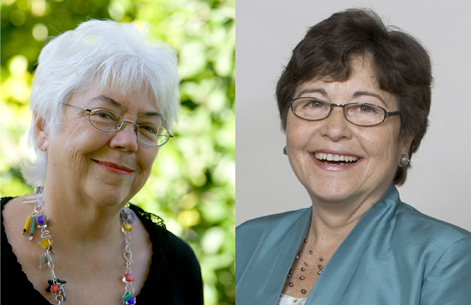 Featured Guest Speakers
Featured Guest Speakers
Alma Flor Ada is a Professor Emerita at the University of San Francisco; an international, award winning author of over 200 books for young readers; and a leading mentor and philosopher of bilingual education in the United States. Her work has centered in topics of Critical Pedagogy, Bilingual and Multicultural Education, Literacy and Biliteracy and Authorship. She has done extensive work on the relationship between Home and School.
F. Isabel Campoy is the author of numerous children’s books in the areas of poetry, theatre, stories, biographies, and art, and as a researcher she has published extensively bringing to the curriculum an awareness of the richness of the Hispanic culture. As an educator, she specializes in the area of literacy and home school interaction. Campoy is an internationally recognized scholar devoted to the study of language acquisition.
Both Alma Flor Ada & Isabel Campoy have won numerous awards.
Workshops
Choose from 25 other workshops from elementary school topics through program administration. Here is a sampling.
- Keynote breakout workshop: Linguistic Justice: From Theory to Praxis – Dr. April Baker-Bell
- Curriculum-writing using the 2020 WIDA Standards Framework – Maggie Churchill & Hana Prashker
- Creating Equity and Opportunity: Option for Newcomers – Andrea Fonteñez & JoAnne Negrin
- Co-Teaching ELLs in the Mainstream Classroom – Kathryn Suter & Danielle Katz
- How to Use the New ESL 2020 Standards Framework – Michelle Land
- Advocating for Multilingual Learners: Why & How – LeighAnn Matthews
- Equity and Excellence for Specialized Populations – Yasmin Hernandez-Manno
You can finish the day with the book club discussion about Slay by Brittney Morris.
April 5, 2022
Resource Recommendation: Tips for Parents, Parent-Teacher Conferences
By Cecilia Vila
 When parent-teacher conferences came around during my first year as a bilingual teacher, I felt very supported and equipped to deliver feedback and data that would showcase our students’ growth and goals for the year. However, as I went through the first couple of meetings, it quickly became clear that the structure of our parent-teacher conferences demanded a high level of participation and engagement from the families, a collaboration that did not account for cultural differences or levels of experience by the families in participating in this process.
When parent-teacher conferences came around during my first year as a bilingual teacher, I felt very supported and equipped to deliver feedback and data that would showcase our students’ growth and goals for the year. However, as I went through the first couple of meetings, it quickly became clear that the structure of our parent-teacher conferences demanded a high level of participation and engagement from the families, a collaboration that did not account for cultural differences or levels of experience by the families in participating in this process.
To that end, I began to reflect on what the families needed from me to best prepare for the conference, and I resolved to empower the families to advocate and hold me accountable for their students’ academic journey in my classroom. In my research, I came across this resource, available in Spanish as well, that provides some support and structure for the families so they can have a voice and autonomy during the conferences. Ever since, when communicating with my families in the week´s prior, I not only shared a sign up for them to make an appointment for the conference, but I also shared this resource so they could prepare as well.
Cecilia Vila is the NJTESOL/NJBE Secretary and an ELL/Bilingual Program Specialist, Morris School District (Morris County, NJ).
Parent Resources – Video Presentation Highlights
By Kathleen Fernandez
 One of the many resources NJTESOL/NJBE has on its website is the Parent Resources page. At the Pathways to Success for Multilingual Learners NJTESOL/NJBE’s Spring Conference, I will host a video presentation of the parent and family resources available on this webpage. It will demonstrate how to access our YouTube Parent Expo page videos and all the videos uploaded there and how to change closed captions to translate into multiple different languages. These materials and resources are not only a support for parents and families, but for teachers too. The videos and documents can be shared in parent meetings and with colleagues.
One of the many resources NJTESOL/NJBE has on its website is the Parent Resources page. At the Pathways to Success for Multilingual Learners NJTESOL/NJBE’s Spring Conference, I will host a video presentation of the parent and family resources available on this webpage. It will demonstrate how to access our YouTube Parent Expo page videos and all the videos uploaded there and how to change closed captions to translate into multiple different languages. These materials and resources are not only a support for parents and families, but for teachers too. The videos and documents can be shared in parent meetings and with colleagues.
 One particularly useful set of videos is “Your rights as an immigrant parent &/or family member of an immigrant child in New Jersey” which outlines school requirements and code important to families. The video is presented in eleven different languages. Here is the playlist of all available languages: Spanish, Chinese, Haitian Creole, Korean, Turkish, Arabic, Gujarati, Urdu, Russian, Portuguese, and English. The translated PowerPoint document is in the video description area and can be downloaded. The video and PowerPoint are available in English so that administrators and other school staff can also understand the information.
One particularly useful set of videos is “Your rights as an immigrant parent &/or family member of an immigrant child in New Jersey” which outlines school requirements and code important to families. The video is presented in eleven different languages. Here is the playlist of all available languages: Spanish, Chinese, Haitian Creole, Korean, Turkish, Arabic, Gujarati, Urdu, Russian, Portuguese, and English. The translated PowerPoint document is in the video description area and can be downloaded. The video and PowerPoint are available in English so that administrators and other school staff can also understand the information.
The remainder of the Parent Resources video presentation reviews the support materials and links available on the NJTESOL/NJBE website. These resources were developed and organized by the Parent’s rights committee and the Parent Expo presenters and committee. NJTESOL/NJBE hopes that this storehouse of information will enable our multilingual learners, families, and teachers to navigate the larger educational system and their communities with confidence because they have more information.
Kathleen Fernandez is the NJTESOL/NJBE Executive Director.
April 12, 2022
Spring Conference – Friday’s Speakers
 Keynote speaker for Friday: JPB Gerald
Keynote speaker for Friday: JPB Gerald
Educator and theorist seeking justice for the racially, linguistically, and neurologically minoritized
Our Friday Annual Spring Conference keynote, JPB Gerald, is an adult educator and doctoral candidate at CUNY – Hunter College pursuing an EdD in Instructional Leadership. His scholarship focuses on language education, racism, and whiteness, and he lives with his wife, young son, and dog in New York, on stolen Munsee Lenape and Canarsie territory. He hopes you will join him on the journey towards decoding and decentering whiteness in language teaching.
His keynote will be, “What’s Possible? Envisioning an ELT After Whiteness is Decentered”, a presentation based on JPB Gerald’s series of articles, first in 2020 in the BC TEAL journal, and subsequently in 2021 in Language Magazine, all of which focus on whiteness in language teaching and the harm caused by its exclusionary nature. This presentation travels from the past (how whiteness was centered in ELT), to the present (the impact of whiteness in ELT), to a future not yet realized, in which whiteness is decentered in the ELT classroom, in ELT training, and in the ELT industry altogether. This is a presentation that calls for all of us to eschew shortcuts and to take substantive steps towards radical love for racialized students and teachers.
 Guest speaker for Friday: Camilo Montoya-Galvez
Guest speaker for Friday: Camilo Montoya-Galvez
CBS News – Immigration Reporter
Camilo Montoya-Galvez is a three-time Emmy Award-winning bilingual reporter. Camilo is passionate about in-depth and compelling reporting on consequential issues, including immigration debate in the U.S., and American foreign policy in a changing Latin America. Born in a working-class neighborhood in Cali, Colombia’s third largest city, and raised in the sprawling suburbs of northern New Jersey, Camilo found his calling and was able to harness his passions into a degree from Rutgers University, employment at Telemundo and now CBS News as an immigration reporter based in Washington D.C.
Title of workshop: How Being an ELL Shaped My Life
NJTESOL/NJBE Spring Conference: As a Bilingual and ESL Teacher, I am looking forward to…
By Cecilia Vila
 “Exploring the Science of Reading and How It Relates to ELLs” (Presented by Elizabeth Riello-Connors). As the field of bilingual education continues to evolve and more research is released, I am very interested in how the Science of Reading pertains to our English Language Learners and what the research labels as best practices for language acquisition and content integration. In a time were bilingual educators are still asked to teach our ELLs to read in English in the same manner that monolingual students learn to read, very much like trying to fit a square peg in a round hole, it is important we continue our learning and how it applies to our ELL students so we can better advocate for change in instructional practices.
“Exploring the Science of Reading and How It Relates to ELLs” (Presented by Elizabeth Riello-Connors). As the field of bilingual education continues to evolve and more research is released, I am very interested in how the Science of Reading pertains to our English Language Learners and what the research labels as best practices for language acquisition and content integration. In a time were bilingual educators are still asked to teach our ELLs to read in English in the same manner that monolingual students learn to read, very much like trying to fit a square peg in a round hole, it is important we continue our learning and how it applies to our ELL students so we can better advocate for change in instructional practices.
“Curriculum-writing Using the 2020 WIDA Standards Framework” (Presented by Maggie Churchill & Hana Prashker). The updated framework, a document made of over 300 pages, seems very intimidating at a first glance, so I am looking forward to exploring the updates, understanding the key elements, and gathering some ideas of how to implement it into my lessons and curriculum development.
“Brainstorming Strategies for Writing” (Presented by Leah Carmona). Writing instruction has always been an area in which I, a bilingual teacher and ESL, have needed support in. I am looking forward to acquiring some instructional tools to bring back to the classroom and give my ELLs the support they need to develop their writing skills.
Here is the preliminary list of in-person and online workshops.
Cecilia Vila is the NJTESOL/NJBE Secretary and ELL/Bilingual Program Specialist, Morris School District (Morris County, NJ).
April 19, 2022
English Learners in College: From Marginalized to Invisible
By Olivia Sanchez
 This article discusses the idea that in K-12, English learners, by law, are required to receive services. When they go to college, English learners are often left without support regarding the educational system, financial options, and language services. The author suggests changes that can be made both in the K-12 system as well as in colleges. Suggestions include more rigorous classes in high school, guidance for families with English learners who are going to college and language support services for the English Learners.
This article discusses the idea that in K-12, English learners, by law, are required to receive services. When they go to college, English learners are often left without support regarding the educational system, financial options, and language services. The author suggests changes that can be made both in the K-12 system as well as in colleges. Suggestions include more rigorous classes in high school, guidance for families with English learners who are going to college and language support services for the English Learners.
Shared by Hana Prashker, NJTESOL/NJBE Advocacy Committee
You will find other articles linked from this one. Building Better Bridges Into Higher Education for English Learners by Shawna Shapiro gives specific advice for helping English learners succeed. The main point of it being that knowing English is not the only factor for success. Students may also have learning differences, health problems, or family struggles. Among her suggestions are greater academic rigor in high school, helping students self-assess to choose their college courses, and tracking them through their college experience.
The Community College Perspective
by Marilyn Pongracz
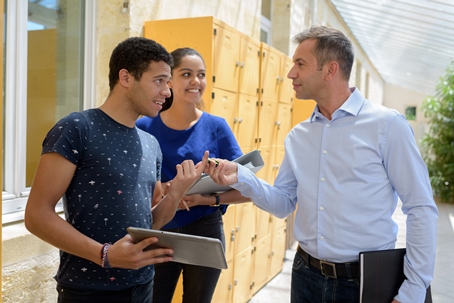 High school and college are very different situations. How can students succeed in the transition? Understanding the college setup will help.
High school and college are very different situations. How can students succeed in the transition? Understanding the college setup will help.
Most of the students who take ESL classes in community college have the specific goal of learning English or improving their English skills. They have graduated secondary school and perhaps the university in their home country. Students whose native language is English, and who attended school in the US, but have tested as unprepared for the rigor of college courses, take skills classes.
Multilingual learners who have excelled in high school continue with success in college. Others, who for whatever reason, have not done well, might be placed in ESL or skills courses depending on the number of years in school in the United States and other factors. Specific placement is determined from test scores.
Community college classes are generally smaller than university courses, and many teachers take extra time with students who are struggling. Other services include counseling, mentoring, advising, and tutoring, but apart from teachers’ recommendations, students are on their own to access the assistance. Financial problems, especially the limitations of financial aid for students who need preliminary courses, are recognized, and community colleges have taken steps to guide students through the maze of options and help them move up as quickly as possible.
Knowledge of what students face as they transition from high school to college can help them succeed.
Marilyn Pongracz is the ESL Tutoring Supervisor at Bergen Community College and the NJTESOL/NJBE Technology Coordinator.
April 26, 2022
Spring Conference – Keynote Speaker for Thursday: Dr. Mariana Castro
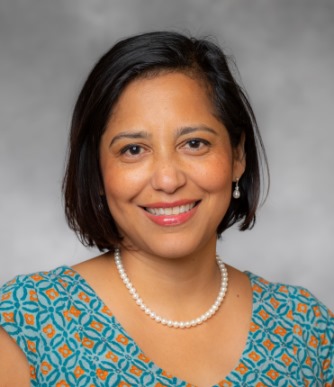 Dr. Castro serves as the current Deputy Director and the Interim Director of Business Services at Wisconsin Center for Education Research. She brings over 30 years of experience in education to her research and development work. Her extensive service to the field of education includes curriculum and instruction, language development, teacher preparation and professional learning. In her research, She integrates her background as an educator, her passion for working with multilingual children, youth and their teachers, and her commitment for social justice. She started with WIDA in 2006 as a professional learning delivery specialist and since then has held positions coordinating, managing and directing Professional Development, the Standards Department, and as a researcher focused on language development. She has also led the development of WIDA Standards and related initiatives for early years and K-12 in English and Spanish.
Dr. Castro serves as the current Deputy Director and the Interim Director of Business Services at Wisconsin Center for Education Research. She brings over 30 years of experience in education to her research and development work. Her extensive service to the field of education includes curriculum and instruction, language development, teacher preparation and professional learning. In her research, She integrates her background as an educator, her passion for working with multilingual children, youth and their teachers, and her commitment for social justice. She started with WIDA in 2006 as a professional learning delivery specialist and since then has held positions coordinating, managing and directing Professional Development, the Standards Department, and as a researcher focused on language development. She has also led the development of WIDA Standards and related initiatives for early years and K-12 in English and Spanish.
Dr. Castro has a Ph.D. in Curriculum and Instruction at the University of Wisconsin-Madison and a M.S. from the University of Wisconsin-Whitewater. She currently serves as the PI for research related to language practices of multilingual students, curriculum and instruction in dual language immersion programs, teacher professional learning and family engagement.
Keynote Topic: Language Power: Finding Pathways to Success Through Equitable Education for Multilingual Learners
Breakout Session: Language Power in Action: Enacting Equitable Education Through the Teaching and Learning of Academic Language
Thursday’s Highlights at the Spring Conference
Thursday’s Featured Guest Speaker: Dr. Steve Krashen (via Zoom)
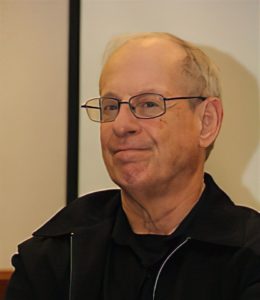 Stephen Krashen received his PhD. in Linguistics from the University of California, Los Angeles in 1972. He is professor emeritus at the University of Southern California. He is a linguist, educational researcher, and political activist. Krashen has, among papers and books, more than 486 publications, contributing to the fields of second-language acquisition, bilingual education, and reading. He is known for introducing various hypotheses related to second-language acquisition, including the acquisition-learning hypothesis, the input hypothesis, the monitor hypothesis, the affective filter, and the natural order hypothesis. Most recently, Krashen promotes the use of free voluntary reading during second-language acquisition, which he says “is the most powerful tool we have in language education, first and second.”
Stephen Krashen received his PhD. in Linguistics from the University of California, Los Angeles in 1972. He is professor emeritus at the University of Southern California. He is a linguist, educational researcher, and political activist. Krashen has, among papers and books, more than 486 publications, contributing to the fields of second-language acquisition, bilingual education, and reading. He is known for introducing various hypotheses related to second-language acquisition, including the acquisition-learning hypothesis, the input hypothesis, the monitor hypothesis, the affective filter, and the natural order hypothesis. Most recently, Krashen promotes the use of free voluntary reading during second-language acquisition, which he says “is the most powerful tool we have in language education, first and second.”
Many of his publications are available for free download at sdkrashen.com and at researchgate.net.
Krashen’s presentation: Fundamentals and recent progress, including the power of stories (a.k.a. literature, fiction) and the power of libraries
Workshops
Choose from 20 other workshops from elementary school topics through program administration. Here is a sampling.
Content and ESL Teacher Collaboration – Ashley Singh & Christina Tuozzolo
Advocating for Educational Equity for Multilingual Learners – Jessica Hunsdon & Kathleen Fernandez
Curriculum-writing using the 2020 WIDA Standards Framework – Maggie Churchill & Hana Prashker
Language, Literacy and Content for Middle Schoolers – Karen Horton
Strategies to Boost Academic Language in Content – Tina Kern
Successful Multi-age Bilingual Classroom Programs – Kathleen Bowman
Writing: A Pathway to Build Connections – Monica Artiga & Claudia Lagos
See the full list of workshops.
Join us for the President’s Awards Ceremony and Reception at 6:00 pm.
May 3, 2023
A Success Story – from Camilo Montoya-Galvez’s Third Grade ESL Teacher
Camilo Montoya-Galvez is Friday’s Guest Speaker at the Spring Conference
 By Noreen Drucker
By Noreen Drucker
I first met Camilo in the main office of the Fernbrook School in February 2005 when I threw open the door looking for my new third grade students. I saw him sitting on the bench with another student, Krystyna. As they realized they did not have a common language, no words were exchanged between them. They both had that ” Where am I and what am I doing here? ” look on their faces. Their body language betrayed their fear and loneliness. I gave them my biggest smile, my loudest “HELLO!” and ushered them to the ESL classroom.
At first, Camilo was very shy and reserved. He studied situations before reacting to them. He could be stubborn at times, a trait I hoped he would convert to determination and perseverance as he matured. And actually, it did.
Something I noticed early on about Camilo was that he had an interest in history, geography, and world events. Being bilingual myself, he often spoke of these things to me in Spanish. I later learned that his parents read the newspaper to him, and his father discussed world events with him as they walked together to school. His parents built the foundation upon which he would excel in school and in life.
When Camilo first arrived from Colombia, he did not speak English. However, he was totally proficient in Spanish and had a flair for writing in his native language. He had no trouble whatsoever using his native language skills and transferring those skills over to English. As he became a more proficient reader, his vocabulary broadened, and he began to develop his own style of writing.
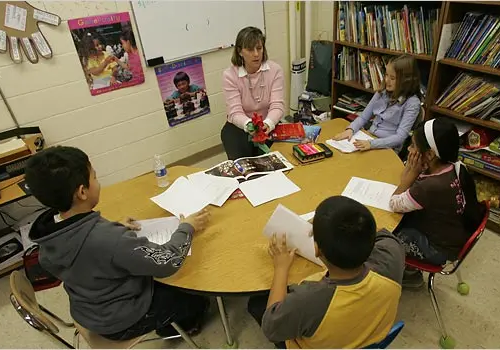 I think Camilo had a very positive experience at the Fernbook School in Randolph, New Jersey. The building principal, Dr. Debbie Grefe, was bilingual and made it a point to interact and support all the ESL students. The students were grouped with ESL Designated Homeroom Teachers – teachers who specifically asked for the ESL kids, as they enjoyed the cultural diversity they brought to the classroom. All of us had high expectations of these students and held them accountable for what they could do. Best of all, the students relied on each other for guidance and strength.
I think Camilo had a very positive experience at the Fernbook School in Randolph, New Jersey. The building principal, Dr. Debbie Grefe, was bilingual and made it a point to interact and support all the ESL students. The students were grouped with ESL Designated Homeroom Teachers – teachers who specifically asked for the ESL kids, as they enjoyed the cultural diversity they brought to the classroom. All of us had high expectations of these students and held them accountable for what they could do. Best of all, the students relied on each other for guidance and strength.
I specifically remember a conversation that took place between a 5th grader and Camilo, who was a fourth grader at the time. The girl did not think she needed to go to homework club. She preferred to go home after school and play video games. Camilo staunchly disagreed with her and said, “Don’t you know why your parents brought you here? So you could have a better life!”
The following year there were four English learners in grade four who had to take the NJASK test. No one thought that they would pass it after only a year and a half of ESL classes. They were wrong. All four students, Krystyna, Bryan, Ilona and Camilo scored at the proficiency level in Language Arts. Camilo also scored advanced proficient in Math and Science.
Camilo phased out of the ESL program at the end of fourth grade scoring an overall 6.0 on the Access test. Since then, he has graduated from Rutgers and now works for CBS Live focusing on Immigration Issues on the southern border.
Camilo Montoya-Galvez will speak at the NJTESOL-NJBE Annual Conference on Friday June 3rd. The title of his presentation is “How Being an EL Shaped my life.” If you are attending the conference on Friday, come listen to this young man’s success story.
Noreen Drucker served on the NJTESOL/NJBE Executive Board between 2009 and 2015, first as the ESL Elementary 1-5 SIG Representative, and then as the Bilingual/ESL Middle School 6-8 SIG Representative.
May 10, 2022
CUNY Translanguaging Guides
By LeighAnn Matthews
 Are you looking for ways to integrate translanguaging into your classroom but not sure where to start? CUNY-New York State Initiative on Emergent Bilinguals (NYSIEB) works to improve the education of emergent bilingual students across New York State. They have a plethora of free resources that offer strategies and approaches for teachers working with multilinguals, specifically focusing on translanguaging- students making use of their full linguistic repertoire to communicate and learn new content.
Are you looking for ways to integrate translanguaging into your classroom but not sure where to start? CUNY-New York State Initiative on Emergent Bilinguals (NYSIEB) works to improve the education of emergent bilingual students across New York State. They have a plethora of free resources that offer strategies and approaches for teachers working with multilinguals, specifically focusing on translanguaging- students making use of their full linguistic repertoire to communicate and learn new content.
The CUNY NYSIEB translanguaging guides are a particular favorite “go to” resource of mine – specifically, the Translanguaging Guide for Educators by Christina Celic and Kate Seltzer. The guide starts out with an overview of theory by Ofelia García. Then you are introduced to how to use the guide itself. It is designed to be used in a collaborative way as outlined on page 7. The guide is divided into three parts. Part one sets the stage and the context for translanguaging work –– the development of a multilingual ecology in the school, the design of instruction and of collaborative work, and the use of multilingual resources. Part two focuses on using translanguaging strategies for the learning of rigorous academic content and the development of advanced literacy practices. And Part three gives attention to how translanguaging can assist with specific aspects of language development.
The Translanguaging Pedagogy for Writing Guide is also a very useful resource for educators. It has practical actions and tools as well as the theoretical framework behind it. I have found that writing in particular lends itself very well to translanguaging pedagogy.
Happy exploring! Translanguaging is truly beneficial for multilinguals of all ages and in all program types across the country. I hope you enjoy these resources as much as I do!
LeighAnn Matthews is the NJTESOL/NJBE Liaison and the K-12 ESL Instructional Coach at the Bridgewater Raritan Regional School District.
Translanguaging in Curriculum and Instruction: A CUNY-NYSIEB Guide for Educators
 By Sarah Hesson, Kate Seltzer & Heather H. Woodley
By Sarah Hesson, Kate Seltzer & Heather H. Woodley
Also linked from the page above, this translanguaging packet includes curriculum and pedagogy from which teachers can choose lessons that fit their students’ needs.
It begins with basic guides followed by specific lesson plans for all grades: elementary school, middle school, and high school. There are performance tasks, collaborative work, options for students and teachers, texts, links, standards, vocabulary and sentence building tasks. It includes methodology that encourages translanguaging for multi-genre writing, multilingual research, and assessments.
You will find specific instructions for using the Internet as a multilingual resource. It also covers the benefits of using multilingual texts about the same topic – one in the home language and another in English for multilingual research: “One of the advantages of knowing multiple languages is that you can use all of them to acquire information. When bilingual students research a topic using their entire linguistic repertoire, they experience the real-life value of being multilingual.”
The guide also offers detailed answers to every question about translanguaging. Here is the author’s brief summary.
- Translanguaging refers to the normal discourse practices of bilingual individuals and families. It treats bilingual discourse as the norm.
- Translanguaging also refers to pedagogical practices that use bilingualism as a resource. These practices can be used in the education of emergent bilinguals, but also with bilingual students beyond the initial points of the bilingual continuum. They are also relevant for the education of monolingual students.
- Translanguaging goes beyond traditional notions of bilingualism and second language teaching and learning.
- Translanguaging is used differently in ESL, transitional bilingual education, one way bilingual education (developmental) and two-way dual language bilingual education (two-way immersion) because the goals of such programs are different
You can find this resource here.
May 17, 2022
ELL/Bilingual Department Asynchronous Support Idea:
Creating a Department’s Newsletter to Build Relationships and Professional Capacity
By Cecilia Vila
 As the pandemic continues to hinder our ability to build relationships with our colleagues and to build their capacity in the traditional way PD, PLCs, and other in-person events had done in the past but that are no longer allowed, our ELL/Bilingual department began sharing a monthly newsletter with all teachers and administrators in schools grades K-5.
As the pandemic continues to hinder our ability to build relationships with our colleagues and to build their capacity in the traditional way PD, PLCs, and other in-person events had done in the past but that are no longer allowed, our ELL/Bilingual department began sharing a monthly newsletter with all teachers and administrators in schools grades K-5.
This monthly newsletter provides guidelines for instruction, upcoming events and important dates, and opportunities for ELL and Bilingual educators to continue developing their instructional practices. But it also acknowledges the need to create relationships within the members of the department, so we aim to include a “getting to know you section” that highlights multiple members of the team and gives them a space to share pictures and a little introduction blurb.
We have utilized Canva.com and SlidesGO to design the digital newsletter as both options give the opportunity to embed resources and links so the Newsletter can also become a toolkit to support the teachers and administrators of ELLs.
Cecilia Vila, NJTESOL/NJBE Secretary
ELL/Bilingual Program Specialist, Morris School District, Morris County, NJ
NJTESOL/NJBE Chapters Build Relationships Locally
By Kathleen Fernandez
 I can pinpoint the beginning of my journey as an experienced ESL professional to a meeting in 1988 when I was invited to join the Burlington County ESL Consortium. Burlington County in the 1980’s had pretty much one ESL teacher per district, so this organization was essential in keeping us all informed about current issues in the state and professional development in second language teaching.
I can pinpoint the beginning of my journey as an experienced ESL professional to a meeting in 1988 when I was invited to join the Burlington County ESL Consortium. Burlington County in the 1980’s had pretty much one ESL teacher per district, so this organization was essential in keeping us all informed about current issues in the state and professional development in second language teaching.
Today NJTESOL/NJBE’s County Chapters continue to provide local support to ESL and Bilingual teachers throughout New Jersey. Current meetings have been online and open to all members of the organization and others have been moving back to in person gatherings.
Recent online topics have been Middlesex County’s “NJDOE English Language Learner Exit and Entry Document” and Bergen County’s “Unplugged – Fun Games to Play that Don’t Require the Computer”. Professional development certificates are available for all meetings. In person or online, this network of professionals encourages mentorship, collegiality, and advocacy. They are open to all members of NJTESOL/NJBE and guests.
The support and learning opportunities I received as a member of the Burlington Chapter continue to enrich my life not only professionally, but personally with long time friendships with people who really understand what it means to educate Multilingual Learners.
More information about chapters is available on our website at https://njtesol-njbe.org/chapters/ and are announced regularly on the NJTESOL/NJBE hotlist.
Kathleen Fernandez, Executive Director NJTESOL/NJBE
June 14, 2022
Why Recruiting New Teachers Matters to You
 By Kathleen Fernandez
By Kathleen Fernandez
NJTESOL/NJBE’s Advocacy Committee joined with NJEA and many other educational organizations in New Jersey to support the elimination of edTPA as a requirement for teacher certification in our state. While to some this seems unrelated to our mission to support multilingual speakers and bilingual/ESL programs, it is, in fact, directly related to our students who may wish to become educators and to the recruitment of these young people to become future colleagues.
The teacher shortage which had been coming was exacerbated by increased retirements during the pandemic; now areas like ESL, Bilingual Education, and World Language are experiencing a lack of qualified candidates, so much so that districts are going overseas to recruit multilingual instructors for their classrooms
(To fill shortage, N.J. school district will sponsor teachers from other countries). When there are unfilled openings it impacts our students and our teaching; for example when class sizes increase because there aren’t enough certified staff. We have so many multilingual learners in New Jersey, what can we do to “home grow” our own students to fill these many vacancies?
Several New Jersey universities are trying to tackle the issue. Kean, Montclair, Rowan, and Rutgers have programs reaching into high schools where there are teaching shortages to encourage high school students to become educators, particularly Black and minoritized populations. These young people have not been drawn to education as a career for many reasons and need support in order to be successful.
Cutting edge teacher recruitment programs reach out to large groups of students to engage with the ones who may not think they want to be teachers, but may be drawn to education. This is significant to NJTESOL/NJBE because our students thrive with teachers who are multilingual even if they are not ESL/Bilingual certified. Another key aspect to these programs is professional development in the district for these new teachers in the classroom.
 What can you as a NJTESOL/NJBE member do to support these future educators?
What can you as a NJTESOL/NJBE member do to support these future educators?
- Encourage students to consider education as a career. Speak positively about the impact teachers make on their communities and the personal rewards of shaping the future.
- Start a NJ Future Educators Association chapter in your middle school or high school
- If your school has a chapter or a Tomorrow’s Teachers course, volunteer to speak about the need for bilingual educators
- Be politically active. NJTESOL/NJBE has partnered with VoterVoice to make it easy to contact NJ legislators to let them know your opinion on educational issues. In the upcoming months you will see Action Alerts on several major issues including:
- The Assembly voting to eliminate edTPA, it has already passed the Senate
- A package of bills supporting teacher recruitment, tuition reimbursement, and scholarships to encourage minoritized candidates to pursue educational careers
- Significant changes to the Bilingual Education Code, particularly in the area of accountability and compliance
- Join our Advocacy Committee, email advocacy@njtesol-njbe.org, or your local county NJTESOL/NJBE Chapter to participate in identifying issues of importance to our field and targeting solutions
Sometimes teachers are incredibly focused on their own classrooms and districts, but what happens throughout the state impacts our lives and the learning conditions of our students.
When we don’t look around, we are caught off guard and it can have unforeseen consequences. Think of how amazing it will be to reach out to a student and encourage them to become a colleague or to send a note to a legislator in support of future teachers. These are simple, concrete steps to frame New Jersey teachers as an even stronger educational force.
Resources
- New Jersey Educators Call for the Elimination of edTPA
- New Jersey’s Teacher Pipeline: The Decline in Teacher Candidates Continues
- Recruiting future educators – We need you! May 2022, pp 14-15.
- Rutgers GSE Partners With N.J. School Districts to Diversify Teaching Staff
- To fill shortage, N.J. school district will sponsor teachers from other countries
- Why minority leadership and recruitment matter
Kathleen Fernandez is the NJTESOL/NJBE Executive Director.
Announcements from Weekly Voices Spring 2022
Mercer Regional Chapter – The next meeting will be on March 24th from 6-7 pm.
Presenters are Barbara Tedesco and Elizabeth Franks; Tools for Equity touching on WIDA plus Us.
Middlesex County Chapter – We would like to invite you to our first meeting!
Virtual Meet Up, Friday, March 25, 2022, 4:30-5:30 pm, PD Certificates available.
Have you read the 2022 Annual Voices Journal? If not, it’s here for you.
Scholarships and Awards for your students – Be sure to have your students apply before it is too late! The deadline is April 8th!
Spring Conference – There is still time to register for any or all of the three in-person days or the video library.
Please join the Passaic County Chapter at our End of the year Networking Event.
Clifton NJ, Thursday, April 7, 2022, 6:00 pm. Follow us on Instagram!
Bergen County Chapter Meeting – “Unplugged – Fun Games to Play that Don’t Require the Computer” Presented by Luigina (Gina) Finneran and Yuki Kikuyama, Thursday, April 28, 2022, 4:30 PM – 5:30 PM
The Middlesex County Chapter would like to invite you to our Virtual Meetup
Topic: May 2021 NJDOE English Language Learner Exit and Entry Document Friday, May 13, 2022, 4:30-5:30pm, PD Certificates available.
 Visit our home page for links to past and present Voices issues.
Visit our home page for links to past and present Voices issues.
